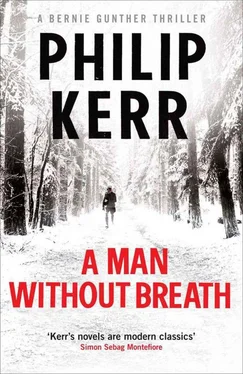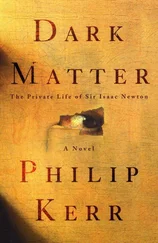Philip Kerr - A Man Without Breath
Здесь есть возможность читать онлайн «Philip Kerr - A Man Without Breath» весь текст электронной книги совершенно бесплатно (целиком полную версию без сокращений). В некоторых случаях можно слушать аудио, скачать через торрент в формате fb2 и присутствует краткое содержание. Год выпуска: 2013, Издательство: Quercus, Жанр: Триллер, на английском языке. Описание произведения, (предисловие) а так же отзывы посетителей доступны на портале библиотеки ЛибКат.
- Название:A Man Without Breath
- Автор:
- Издательство:Quercus
- Жанр:
- Год:2013
- ISBN:нет данных
- Рейтинг книги:4 / 5. Голосов: 1
-
Избранное:Добавить в избранное
- Отзывы:
-
Ваша оценка:
- 80
- 1
- 2
- 3
- 4
- 5
A Man Without Breath: краткое содержание, описание и аннотация
Предлагаем к чтению аннотацию, описание, краткое содержание или предисловие (зависит от того, что написал сам автор книги «A Man Without Breath»). Если вы не нашли необходимую информацию о книге — напишите в комментариях, мы постараемся отыскать её.
A Man Without Breath — читать онлайн бесплатно полную книгу (весь текст) целиком
Ниже представлен текст книги, разбитый по страницам. Система сохранения места последней прочитанной страницы, позволяет с удобством читать онлайн бесплатно книгу «A Man Without Breath», без необходимости каждый раз заново искать на чём Вы остановились. Поставьте закладку, и сможете в любой момент перейти на страницу, на которой закончили чтение.
Интервал:
Закладка:
According to the map the west and east bridges were destroyed, and that left three in the middle or, if you were a Russian, a log-raft passenger ferry that resembled something from my time at a boys’ summer camp on Rugen Island. On the north bank of the river I slowed the car as I came in sight of the local Kremlin – a fortress enclosing the centre of the ancient city of Smolensk. On a hilltop, behind the castellated red-brick walls built by Boris Godunov, stood the city’s cathedral with its distinctive pepper-pot domes and tall white walls, and looking to my eyes as ugly as an outsized wood-burning stove. At least now I could say that I’d seen it.
I showed my papers to the military police guards at the checkpoint on the Peter and Paul bridge, asked for directions to the German Kommandatura, and was directed to go south on Hauptstrasse.
‘You can’t miss it, sir,’ said the bridge sentry. ‘It’s opposite Sparkassenstrasse. If you find yourself on Magazinstrasse, you’ll have gone too far.’
‘Are all Smolensk street names in German?’
‘Of course. Makes it a lot easier to get around, don’t you think?’
‘It certainly does if you’re German,’ I said.
‘Isn’t that what it’s all about, sir?’ The sentry grinned. ‘We’re trying to make it as much like home as possible.’
‘That’ll be the day.’
I drove on, and in the shadow of the Kremlin wall on my right, I went along Hauptstrasse until I saw what was obviously the Kommandatura – a grey stone building with a pillared portico and several Nazi Party flags. An extensive series of German street pointers had been erected in the square in front of this building – many of them on a broken Soviet tank – but the general effect was not one of clarity of direction but confusion; a sentry stood in the middle of the pointers to help Germans make sense of their own signs. The red of the flags on the Kommandatura added an almost welcome splash of colour in a city that was as grey and green as a dead elephant. Underneath the flags a dozen or so soldiers were watching a boy, riding bareback on a spavined white horse, perform a few tricks with the nag. From time to time they would toss a few coins onto the cobbled street, where they were collected by an old man wearing a white cap and jacket who might have been some relation to the boy or possibly the horse. Seeing me, two of the soldiers came over as I pulled up and saluted.
‘Can’t leave it there, sir,’ said one. ‘Security. Best leave it around the corner on Kreuzstrasse, next to the local cinema. Always plenty of room there.’
Three very ragged children – two boys and a girl, I think – watched me park the Tatra in front of some German propaganda posters that were almost as scruffy as they were. I’d seen some poor children in my time, but none as poor as these three urchins. Despite the cold all of them were barefoot and carrying foraging bags and mess tins. They looked as if they had to fend for themselves and were not having much success, although they appeared to be healthy enough. All of this looked a long way from the smiling faces and the soup bowls and the large loaves of bread depicted on the posters. Were their parents alive? Did they even have a roof over their heads? Was it any of my business? I felt a strong pang of regret as momentarily I considered the carefree life they might have been enjoying before my countrymen arrived during the summer of 1941. I wasn’t the type who ever carried chocolate, so I gave each of them a cigarette, assuming they were more likely to trade than smoke it. There are times when I wonder where charity would be without us smokers.
‘Thank you,’ said the oldest child, speaking German – a boy maybe ten or eleven. His coat had more patches than the map in my pocket and on his head was a side cap, or what the more graphically-minded German soldier sometimes called a cunt cover. He tucked the cigarette behind his ear for later, like a real working man. ‘German cigarettes are good. Better than Russian cigarettes. You’re very kind, sir.’
‘No, I’m not,’ I said. ‘None of us are. Just remember that and you won’t ever be disappointed.’
Inside the Kommandatura I asked the desk clerk where I could find an officer, and was directed to the first floor. There I spoke to a slimy fat Wehrmacht lieutenant who could have given a whole week’s rations to the children outside and not even noticed. His army belt was on its last notch and looked as if it might have appreciated some time to relax a little.
‘Those people in the street outside, doesn’t it bother you they look so desperate?’
‘They’re Slavs,’ he said, as if that was all the excuse needed. ‘Things were pretty backward in Smolensk before we got here. And believe me, the local Ivans are a lot better off now than they ever were under the Bolsheviks.’
‘So is the Tsar and his family, but I don’t figure they think that’s a good thing.’.
The lieutenant frowned. ‘Was there something specific I could help you with, sir? Or did you just come in here to give your conscience a little air?’
I nodded. ‘You’re right. I’m sorry. That’s exactly what I was doing. Forgive me. As a matter of fact I’m looking for some sort of scientific laboratory.’
‘In Smolensk?’
I nodded. ‘Somewhere that might own a stereo microscope. I need to carry out some tests.’
The lieutenant picked up the telephone and turned the call-handle. ‘Give me the department store,’ he said to the operator. Catching my eye, he explained: ‘Most of the officers stationed here in Smolensk are using the local department store as a barracks.’
‘That must be handy if you need a new pair of underpants.’
The lieutenant laughed. ‘Conrad? It’s Herbert. I have an officer of SD who’s trying to find a scientific laboratory here in Smolensk. Any ideas?’
He listened for a moment, uttered a few words of thanks and then replaced the receiver.
‘You could try the Smolensk State Medical Academy,’ he said. ‘It’s under German control, so you should be able to find what you’re looking for there.’
We went to the window and he pointed to the south.
‘About half a kilometre down Rote-Kreuzer Strasse and on your right. Can hardly miss it. Big canary-yellow building. Looks like the Charlottenburg Palace in Berlin.’
‘It sounds impressive,’ I said and walked to the door. ‘I guess the Ivans in Smolensk can’t have been as backward as all that.’
It was a short drive to the Smolensk State Medical Academy and, as promised, it wasn’t easy to miss. The academy was enormous but, like a lot of buildings in Smolensk, the place showed signs of the ferocity of the battle waged by the retreating Red Army, with many of the windows on the five stories boarded up, and the yellow stucco facade pitted with hundreds of bullet holes. The triple arches of the entrance were protected with sandbags and on the roof was a Nazi flag and what looked like an anti-aircraft gun. While I was there an ambulance pulled up out front and disgorged several heavily-bandaged men on stretchers.
When the German medical personnel and Soviet nurses on the front desk were done admitting the new arrivals I explained my mission to one of the orderlies. The man listened patiently and then led the way up and through the enormous hospital, which was full of German soldiers who had been wounded during the battle of Smolensk and were still awaiting repatriation to the fatherland. We reached a corridor on the fifth floor where there was not one but several laboratories, and he presented me courteously to a small man wearing a white coat that was a couple of sizes too big for him, as well as mittens and a Soviet tank crewman’s helmet which he snatched off when he saw me standing there. The bow was unctuous, but understandable when dealing with SD officers.
Читать дальшеИнтервал:
Закладка:
Похожие книги на «A Man Without Breath»
Представляем Вашему вниманию похожие книги на «A Man Without Breath» списком для выбора. Мы отобрали схожую по названию и смыслу литературу в надежде предоставить читателям больше вариантов отыскать новые, интересные, ещё непрочитанные произведения.
Обсуждение, отзывы о книге «A Man Without Breath» и просто собственные мнения читателей. Оставьте ваши комментарии, напишите, что Вы думаете о произведении, его смысле или главных героях. Укажите что конкретно понравилось, а что нет, и почему Вы так считаете.












